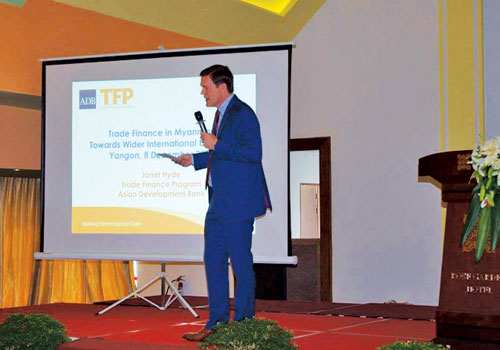The Central Bank of Myanmar (CBM) may allow banks to launch trading services if local banks are unable to facilitate trade financing for importers and exporters (Director General of the CBM)
20 กุมภาพันธ์ 2560
“The Central Bank has already allowed local private banks to do trade financing. If they [local private banks] cannot fulfil the matter of trade financing, we have a plan to allow foreign bank branches in Myanmar to serve importers and exporters with trade only accounts [trading accounts], but other types of account [such as saving accounts] will not be given permission to open at these branches,” he said.
Currently, there are 13 international financial institutions which have been given licences by the Central Bank to open branches in Myanmar. The Central Bank allows these foreign bank branches to open accounts only as joint ventures with local banks. The new plan means that joint ventures are no longer a pre-requisite and that foreign banks are free to open trading accounts on their own.
But, according to exporters and importers, U Win Thaw said that Central Bank will allow foreign banks to offer trading account services for them only if local private banks cannot provide adequate resources for trade financing ventures.
As businessmen encounter difficulties in securing funds from local banks, they reflected the situation when meeting with the Ministry of Planning and Finance, the Central Bank and the Ministry of Commerce, lobbying the authorities to allow foreign banks to complement the financial supply.
“Some private banks offer trading financing but the amount is very small. The amount a bank can support an exporter is just US$ 4 or 5 million. They cannot grant the amount necessary for the businesses.
“As there are so many traders, banks cannot provide much resources and the maximum amount a bank can give is about five million or 10 million,” said Dr Soe Tun, chair of Myanmar Rice Entrepreneurs Association, himself also a trader involved in import and export businesses.
Currently, nine banks among 24 local banks are involved in trade financing and they support traders with pre-shipment financing and post-shipment financing. Pre-shipment financing refers to a loan or advance granted to an exporter for financing the purchase, processing, manufacturing or packing of goods prior to shipment. Post-shipment financing refers to any loan or advance granted or any other credit provided by a bank to an exporter of goods after goods have been loaded on the ship but before they arrive the destination.
According to traders and the Central Bank, these services are provided by international banks.
Local farmers and exporters rely on trade finance instruments because the banks can pre-pay them before the goods reach the destination. Currently, local banks offer this service but the level of financing is inadequate.
“When Sri Lanka discussed with us about the issue of importing Myanmar rice, they said they would like to pay with a letter of credit [L/C] system. But we prefer the Telegraphic Transfer [TT] system.
“In other countries, there is a system of borrowing money [credit financing] under a letter of credit, but that is not available in Myanmar. I think if the foreign banks are allowed to do so, it will be more convenient for us in exporting.
“Therefore, I support the Central Bank’s decision to allow foreign banks to facilitate corporate finance,” Dr Soe Tun said.
A letter of credit refers to a written commitment to pay, by a buyer’s or importer’s bank to the seller’s or exporter’s bank; a Telegraphic Transfer (TT) is an electronic method of transferring funds utilised primarily for overseas wire transactions.
“Our banks are not as strong as those in other countries. The Central Bank must [set policies to] help the private banks to grow and develop… Trade financing cannot succeed without sufficient capital,” said U Than Lwin, senior adviser of Kanbawza Bank.
“Our bank [KBZ] is the largest bank in Myanmar but it is not as big as the smallest banks in Thailand. Our country is 50 years behind in terms of development and we cannot compete with international banks for now.”
Dr Soe Tun added that if traders can open trading accounts in foreign countries, they can have access to the enormous pool of capital in international banks. Thus, the capital and revenue in trade, which belongs to Myanmar nationals, can eventually return to Myanmar from abroad.
According to U Win Thaw, the Central Bank is committed to liberalising the financial sector gradually, and it has a framework for foreign banks to join the sector step by step, while giving time for local banks to develop and catch up.
Reference : (The Myanmar Times: http://www.mmtimes.com/index.










